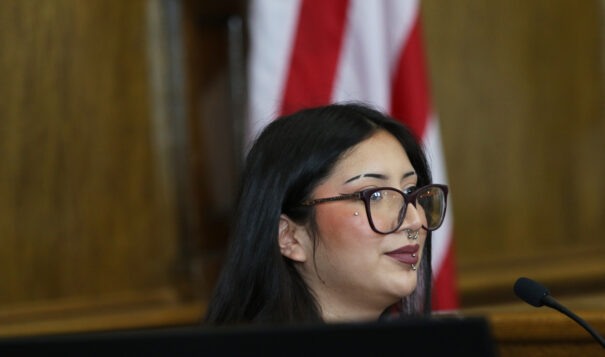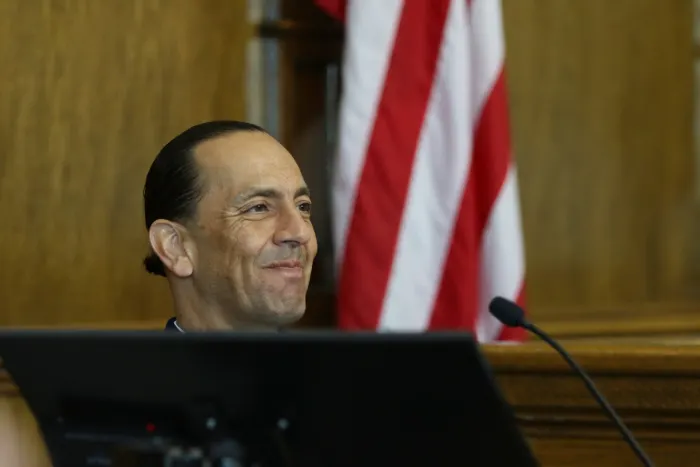News Based on facts, either observed and verified directly by the reporter, or reported and verified from knowledgeable sources.
Indigenous experiences headline third day of Montana trial
 Sariel Sandoval, a youth plaintiff, testifies during the Held v. Montana trial in Helena on June 14, 2023. (Photo credit Micah Drew)
Sariel Sandoval, a youth plaintiff, testifies during the Held v. Montana trial in Helena on June 14, 2023. (Photo credit Micah Drew)
Enrolled citizens of the Confederated Salish and Kootenai Tribes and Crow Tribe testified to the impact of climate change on cultural heritage
This article is part of a series on the youth-led constitutional climate change lawsuit Held v. Montana, which went to trial in Helena on June 12. The rest of the series can be read at mtclimatecase.flatheadbeacon.com. This project is produced by the Flathead Beacon newsroom, in collaboration with Montana Free Press, and is supported by the MIT Environmental Solutions Journalism Fellowship.
Sariel Sandoval, a citizen of the Bitterroot Salish, Upper Pend d’Oreille, and Diné Tribes and one of 16 youth plaintiffs suing the state of Montana over its contributions to climate change, testified Wednesday that changes to Montana’s environment directly impact her tribal identity.
“The way we identify ourselves as Salish people, sqelixw, the root word translates to ‘flesh and land,’” Sandoval said. “That really shows the importance in our role as human beings and our connection to the land and the natural environment.”
Sandoval testified on the third day of the constitutional climate-change lawsuit against the state of Montana in which the young plaintiffs allege government actions are violating their constitutional right to a clean and healthful environment.
Currently a student at the University of California, Berkeley, studying mathematics and Native American studies, Sandoval said she “definitely” wants to return home after she graduates to a community that has been essential to her life’s trajectory.
Quoting one of her Native American studies professors at Berkeley, Sandoval described Native communities as “post-apocalyptic communities.”
“They’ve lived through genocide, assimilation, relocation, termination and so many other traumas,” she said. “I believe we can definitely adapt and survive climate change, but that doesn’t make it right. We’ve done it before, but that doesn’t mean we need a round two.”
Sandoval showed a lot of emotion from the stand as she spoke about the importance of oral storytelling in her community and her concerns about its role in the future. As an example, she said the tribe’s creation stories, including coyote stories, can be told only when there is snow on the ground.
“The time that we can share those stories and explain to our youth who we are and our place in the world is becoming shorter,” she said. “One day we’re not going to have any snow on the ground. What happens to the stories?”
That’s a question that also concerns Michael Durglo Jr., the environmental director for the Confederated Salish and Kootenai Tribes (CSKT). Place names carry great significance to the tribe, he said, and are imbued with stories that are passed down through the generations, such as Big Bull Trout Stream.
“If there’s no longer bull trout in that stream, does it still carry the name?” he asked the court. “Or do we then say, ‘that’s where the big bull trout used to be, but they’re no longer there.’”
Durglo has spent decades working on climate change issues for the CSKT and nationally, earning accolades from the White House for his efforts. He served as a project leader for the 2016 CSKT Climate Change Adaptation Plan, one of the first tribal climate plans, and founded a youth education and action group, Environmental Advocates for Global and Local Ecological Sustainability (EAGLES). His goal is for EAGLES to understand the necessity of taking action to preserve the environment immediately — an outlook he sees reflected in the youth plaintiffs.
“It’s absolutely necessary for our survival that we take action now. We can’t leave it to them,” he said, pointing to the defense table.
Attorneys for the state have continuously sought to paint Montana’s contribution to global emissions as minimal, and so far have kept cross examinations of expert witnesses short, while declining to question several youth plaintiffs at all.
Two of the youngest plaintiffs, Ruby and Lilian Doyle, are both enrolled citizens of the Crow Tribe. Their father, Shane Doyle, testified on their behalf, describing some of the family’s cultural traditions, including attending Crow Fair every summer.
Crow Fair is the tribe’s annual gathering in August that serves as a cultural celebration and reunion for extended families. It features a rodeo, traditional dances, parades, and namings, and is a favorite tradition of the girls, Doyle said. Both Ruby and Lilian take part in several traditional styles of dancing, but extreme weather in recent years has led the family to decide they shouldn’t take part in the rites.
“I don’t think there is anything honestly comparable in American society to what Crow kids experience at Crow Fair,” Doyle said. “It’s something that is just so unforgettable, it’s such an important part of your identity. If you miss out on that, that’s I think a dramatic loss.”
Doyle also testified to the cultural significance of the seasonal cycles of various plants. Crow Fair, for example, has taken place during the chokecherry harvest for the last 100 years. But a drought several years ago delayed the natural cycle — the fair went forward without bountiful chokecherries, going against its traditional history. He added that all his kids, including Ruby and Lilian, are taught the importance of the natural world to their culture and their future.
“As part of the Crow Tribe we’re taught we have three mothers: your natural mother, your home and your earth. Taking care of those three things is your responsibility,” Doyle said. “So I think that joining this lawsuit was a natural part of that for them from their cultural perspective.”
Additional plaintiff testimony on Wednesday came from Taleah Hernández, a Polson resident, and Georgianna Fischer, who lives in Bozeman.

Hernández talked about seeing recent wildfire scorch the nearby mountains, preventing her from going to work where she trains horses, costing her wages and bringing thick smoke to her hometown. “I feel like I’m losing hope. I wouldn’t want to see anybody under the threat of wildfire near their homes,” she said.
Fischer testified that her competitive Nordic skiing career has been impacted by climate change. In high school, Fischer qualified for the USSA Junior National Cross Country Skiing Championships four years in a row and currently competes for the University of New Hampshire. Partaking in a sport that relies on snowpack keeps Fisher regularly in tune with changes to the climate.
In 2021, at the annual West Yellowstone ski festival, which marks the first competitive opportunity for the region’s skiers every November, a lack of snow canceled the races. How late the season goes into the spring also depends on how much snow remains on the ground and, she said, Montana’s shoulder seasons have seen less and less snow.
During the off-season, Fischer said, her level of training — via trail running and roller skiing — is often reduced by wildfire smoke, which is especially worrisome as she’s become increasingly competitive on the national level.
“The summer is really important to build a good base and get ready for competition season in the winter, so every hour of training really counts in my sport,” she said. “I see on the East Coast, many of those skiers have not experienced these effects and so they are better prepared for the ski season. It’s intimidating starting a ski season knowing that I haven’t fully prepared.”
To round out Wednesday’s witness list, attorneys for the plaintiffs presented testimony from Jack Stanford, an ecologist and the former longtime director of the Flathead Lake Biological Station, who told the court how Montana’s freshwater ecosystems are affected by the warming climate.
Each major freshwater arterial in the state has seen trends of decreasing streamflow, Stanford said, leading to increased water temperatures that impact thousands of species that rely on aquatic environments, including native trout populations.
In addition, Stanford shared streamflow and temperature data, as well as projections, all of which show peak stream flows are occurring earlier in the calendar year, increasing the likelihood of major flooding events. As an example, Stanford referenced last June’s Yellowstone River flood that destroyed the entrance road to Yellowstone National Park and has been called a “500-year flood event” by researchers.
“It seems like we’re getting hundred-year floods every 20 years or so these days,” Stanford said as a slide of the river flooding a nearby town was shown to the court. “These events are occurring more frequently today than in the past. And that’s the consequence of it in the picture there.”
Dateline:
HELENA, Montana
